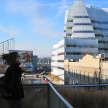Part I: Is There Still an American Dream?
A Road Trip Cum Thesis Project

I had just finished my first year of graduate school in a small, college town in Southeast Alabama. I had never lived in such a small town and I was more than ready to leave. My brother, a fresh graduate of college, was also looking for adventure. Under the guise that I was working on a research project that would ultimately contribute to my thesis, we were off. There was a loose itinerary and a somewhat guided premise: to interview young adults, living in cities, on their thoughts regarding the American Dream; particularly in regards to homeownership. My hypothesis was that the dream was dead and I was ready to be proven right or wrong, or both. I figured the answer would vary region to region but why?
We started off in our adopted hometown of Charleston, SC with two passengers looking for a ride to Washington, DC. The two stowaways were friends of my brother and had familial ties to DC and would help to provide us housing for the weekend. That was another condition of the trip: free housing through friends or friends of friends. After all, I was in graduate school and my brother and I both did not have jobs. In a word, we were on a budget. A tight one at that.
I had not been to our nation's capital since I was a young kid so I was looking forward to seeing it with my adult, mature eyes. It was the Obama era and the country was seemingly full of hope, I wanted to see the epicenter of such hope. I'm still unsure if I saw the tangible aspects of it but it was felt even if it wasn't always discussed. Walking around the various monuments, seeing tourists operating Segways, perusing the alleyways of Georgetown, dodging in and out of various different bars, I could see how both political types and others were drawn to this city. It seemed that a lot of Southerners were drawn to it because it's not as intimidating, nor as cold as New York City and it's still close enough to the Mason-Dixon line to be considered the pseudo-South.
As far as our underlying question goes, we got varying responses. The majority of those that felt homeownership was important, even essential, had been born and raised in the South. Many felt as though it was the ultimate passage into adulthood. Others thought that it wasn't as important, especially since they wanted to stay within the city. They held other things to be more necessary than owning a home, like public transit, walkability, and diversity.
We left our passengers in DC and scooted up I-95 towards New York City. My brother and I were much more familiar with this city, perhaps than any other because we grew up in her suburbs. We ventured into the city almost on a monthly basis until we moved down South. It was our bellwether for city life and it was, perhaps, an unfair indicator of what it means to be a city. Nonetheless, it was our marker.
One aspect of New York City we weren't quite familiar with was the boroughs. I had spent some time on the Fordham campus in the Bronx while in high school. The all-girls school I attended had mixers with Fordham Prep and it made me feel so cosmopolitan. Beyond that, I had little experience with anything other than Manhattan but my good friend had recently moved to Brooklyn—the epicenter of hip. We arrived to the Greenpoint neighborhood in north Brooklyn on a blustery, somewhat cool June day and admired the coffee shops, bars, Polish outposts, and wine shops. Our friend lived in a small apartment with two other girls. She was a high school teacher at a high-risk school nearby. She was very opinionated, always had been.
She did feel, in some ways, as an interloper into this decidedly Polish enclave but at the same time was not the only one and therefore could not be blamed for the gentrification. It was what she could afford and she liked the neighborliness of the area. She knew her baristas, her video store clerks, her bodega owners. She never felt this sense of community in her hometown of Charleston, SC—a city that prides itself on hospitality. It both led us to think, it may be hospitable to others but do we really make room for the locals?
In our few days in Brooklyn, we visited other friends across the borough. We marveled at the tree-lined streets filled with fantastic brownstones. We sat in parks, we ate falafel, and we drank wine on fire escapes. We couldn't imagine a better place to live and we both thought we may end up there someday. We paid no mind to the fact that Winter is always coming, rent is always due, and jobs in Manhattan are all hard to come by. We preferred to stay in our moment of bliss, on that Brooklyn rooftop.
Our next stop was Boston where we stayed with a cousin in her tiny, rent-controlled apartment in Beacon Hill. Perhaps my favorite part of our arrival was the fact that she left her apartment key with the man at the convenience store catty-corner to her place. I loved the familiarity she had with the man and the fact that he had a whole key rack of other neighbor's keys. They all trusted him with the key to their personal lives. I felt as though I stepped back in time.
It was still unseasonably cool and it felt perfect to stroll around Boston. I knew we had been as children but had no memory of the city. I had preconceived notions of overly excited sports fans, Irish people stumbling out of pubs, and American history buffs. It could be all of those things, especially since the Celtics were playing (maybe some sort of playoff game, I can't remember). We steered clear of the definitive Irish pubs but did find friends in the collegiate neighborhoods of Somerville and Cambridge. Somerville felt much like any college area in a big city but Cambridge felt different. It was as if the musty book smell of the libraries of MIT and Harvard wafted in the air to make those who are not Ivy-league educated feel a little less worthy. It's a beautiful part of town with a diverse offering of cuisines, architecture, and retail and despite its storied halls of higher learning, there is a whole culture of down to earth people who may or may not have attended either of those schools.
Our interviews on the American Dream all concluded with people not very interested in homeownership. All were fascinated by the idea that they could get up and move across country for any reason and not have to worry about selling a home before being able to do so. No one wanted to be burdened by cutting the grass, repairing the dishwasher, or pressure washing the deck. Those duties were regaled to the person who had to care about the value of the property, not the leaseholder. I had to agree with these points.
Our next big city on the itinerary was Chicago but it would take us awhile to get there. We decided not to hurry and took our time. We stopped at Niagara Falls to see the wonder and the kitsch. The wonder was great but I can't say we saw much of the kitsch we were looking forward to seeing. After getting soaked by the mist of the Niagara, we ventured on. We found ourselves staying in a roadside motel outside Toledo, Ohio. We woke early to make way for the Windy City, a place neither of us had ever been.
We stayed with a friend that had grown up in Nashville to a well-off family. She was in graduate school yet lived in a high rise overlooking Lake Michigan right off the Magnificent Mile. The next day we explored the major spots like The Bean, admired the amazing examples of American architecture, and walked along the Lake. The next day, our host accompanied us to the more local and hipster neighborhoods of the city. We took in a World Cup game in an Italian cafe and popped in and out of retail shops. She introduced us to her friends who were a mix of Southern and Midwest but had one thing in common: homeownership was not only important, it was inevitable. They all mostly believed that their parents would help them with their first home and that it would, more than likely, be in the suburbs.
We left Chicago with good impressions and thought that it was a nice place to visit but perhaps not as nice to live, mostly because of the treacherous cold. Somehow the benefits of summer did not block our understanding of what a "lake effect wind" can do to the body. Our next big stop would be Denver/Boulder. Crossing the Mississippi, felt like a big milestone and also a step outside of our comfort zone. Up until now, we had the ability to somewhat quickly get back home, to give up. It felt as though crossing that river signified that there was no turning back and we were excited.
To be continued...
About the Creator
Lizzie Boyle
I am an architecture and urbanism enthusiast who also has interests in food and beverage, particularly beer. I also enjoy films both mainstream and indie, travel, local culture, and underground culture.
Enjoyed the story? Support the Creator.
Subscribe for free to receive all their stories in your feed. You could also pledge your support or give them a one-off tip, letting them know you appreciate their work.






Comments
There are no comments for this story
Be the first to respond and start the conversation.